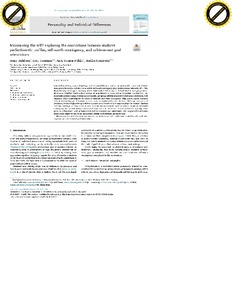Maintaining the self? Exploring the connections between students' perfectionistic profiles, self-worth contingency, and achievement goal orientations
Jenny Ståhlberg; Heta Tuominen; Antti-Tuomas Pulkka; Markku Niemivirta
https://urn.fi/URN:NBN:fi-fe2021042825379
Tiivistelmä
Two studies utilising a group-based approach examined the relationships between perfectionism and achievement goal orientations, and the role academic self-worth contingency plays in this, among university (N = 506, Study I) and general upper-secondary school students (N = 154, Study II). In both studies, four groups of students were identified based on their patterns of perfectionistic strivings and perfectionistic concerns (i.e., perfectionistic profiles) using TwoStep cluster analysis, and group differences in achievement goal orientations were examined while controlling for the effect of academic self-worth contingency. High perfectionistic concerns, with or without high perfectionistic strivings, were connected with goals reflecting relative performance and avoidance, whereas high strivings with low concerns were linked with a stronger emphasis on mastery. Students with low strivings and low concerns were, instead, inclined towards work avoidance. Academic self-worth contingency was highest among students with high concerns, and it contributed significantly to group differences on achievement- and performance-related achievement goal orientations. This suggests that self-worth maintenance might be one of the mechanisms linking perfectionism and motivation.
Kokoelmat
- Rinnakkaistallenteet [29337]
